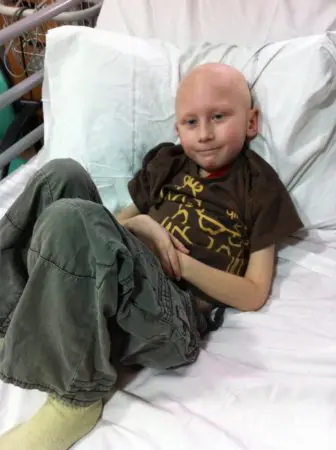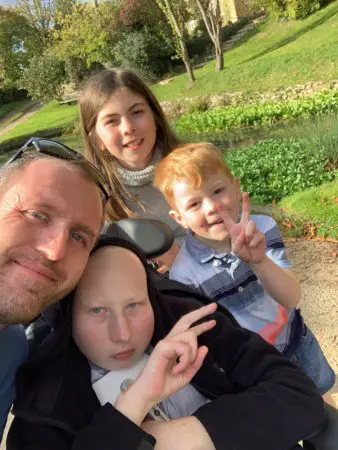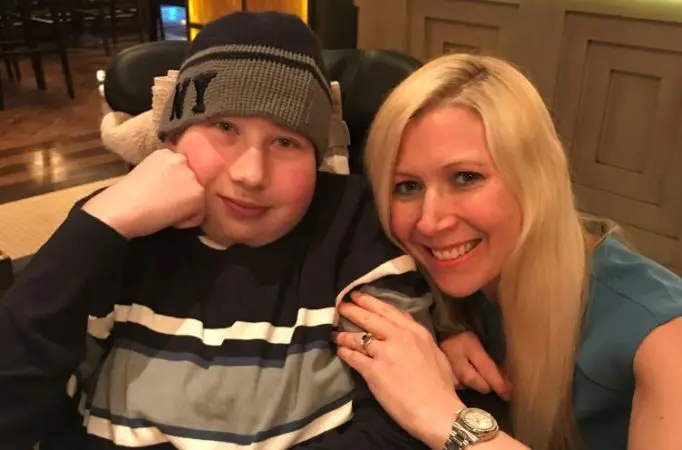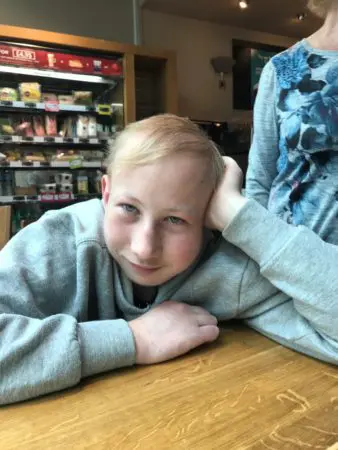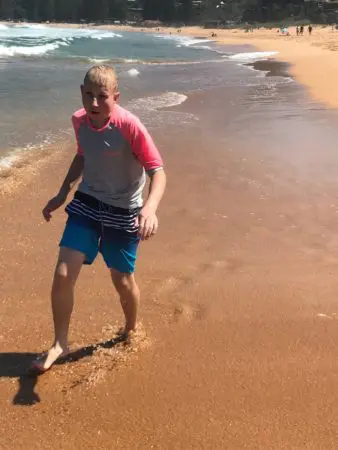Oliver’s story: We couldn’t function without CLIC Sargent
Oliver’s parents Mark and Donna are sharing their story in support of CLIC Sargent’s campaign calling on the government to urgently provide financial support for CLIC Sargent during the coronavirus crisis. We are asking the public to join our campaign by emailing your MP with our call for government funding to ensure children and young people with cancer can access vital social care support.
Mark and Donna said: “The support from CLIC Sargent was vital, we couldn’t have functioned without it. We are supporting CLIC Sargent’s campaign so the charity can continue to be there for more families like ours, living with cancer, at a time when they need it most. No family should have to face cancer alone. We know what a difference the vital emotional, financial and practical support can be.”
Mark and Donna’s family were supported by CLIC Sargent when their son Oliver, was diagnosed with a brain tumour in 2010, and with soft tissue sarcoma in 2018. He sadly died aged 15 last year. Here, Mark and Donna share their story:
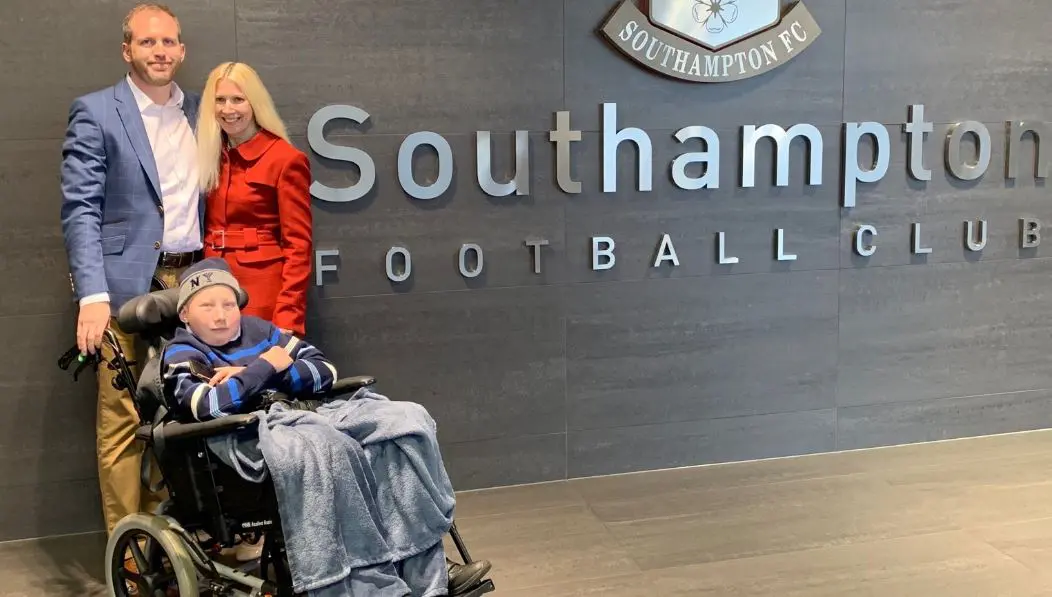
Mark and Donna with Oliver.
We first noticed something wasn’t right the first time Oliver was diagnosed with cancer when he started being sick in the morning when he would wake up.
The GP at that point didn’t suspect anything being wrong – but then Oliver started getting more tired and losing weight. Eventually our family doctor returned from maternity leave and she said she didn’t think something was right – and thought it might be something to do with Oliver’s brain, and so she rushed us to hospital where he had a scan. That’s when he was diagnosed with a brain tumour.
When we were told it was a brain tumour, it was horrific and I left the room and couldn’t cope with it. But there was relief too because we had a diagnosis. Oliver was only six-years-old at the time and so he took it on the chin a little bit and it didn’t faze him too much.
Oliver started treatment for the tumour and they operated and removed as much of the tumour as they could. Once he had recovered from the operation, he had chemotherapy and radiotherapy.
In between all of that he had blood transfusions and caught C. Diff bug and had to be in isolation for five weeks. The cards were really stacked against him and bad.
Once Oliver had recovered from treatment, he went back to school and got on with life. He had knock on effects from treatment with his height and hair growth, and was on growth hormones and with his eating he was tube fed for years. It effected his everyday life, however he still played football and went on to secondary school and amongst that we just had check-up scans. After time, it was deemed he was in remission and his treatment had been a success.
It was always in the back of our minds though as parents that his cancer could come back. It was always there. With the scans every six months you would build yourself up and be nervous.
We knew there was always a possibility it could come back and so mentally we would prepare ourselves. But we just lived life to the full and as much as we could with Oliver. We went as a family to Australia and Italy to just enjoy experiences together and family holidays. We did so much stuff.
We both run our own businesses which in one sense, gave us the freedom to go to hospital whenever we needed to, and we didn’t have to answer to anyone. However if we weren’t at work, then business wouldn’t come in. We had to make redundancies which was really difficult.
We also had our daughter, who was two at the time who needed looking after, and she ended up getting passed around to relatives and grandparents whilst we were with Oliver in hospital.
Second cancer
It was early 2018 when Oliver started getting back pains whilst we were away in Australia. We went to see his consultant about it and he suggested to do an ultrasound just to rule anything out. A week before his scan was due, Oliver had weird sensations in his legs and his legs stopped working over a weekend.
One week he was playing football and the next we had to carry him into hospital because he couldn’t walk. We called his consultant and he told us to bring Oliver to the hospital straight away. At that point we knew what it was and were prepared. They did a scan and diagnosed the sarcoma on his spine. It was putting pressure on his nerves and spinal column.
We were completely distraught. Although Oliver was told it was a good chance it was cancer, he was more concerned about his legs and if he would be able to walk again. The cancer was aggressive and had spread in all his arteries. At that point, the doctors thought he only had weeks to live. It was so difficult.
The doctors operated that afternoon and said there was a chance he wouldn’t make it through the operation. But he got through it. They couldn’t take all of the tumour out, but it was about alleviating the pressure on his spine, and taking the pressure away to stop a life threatening situation.
The operation went well and Oliver started to get some movement back with physio. However when they scanned him a week later, the tumour had grown back bigger than what they had taken out. At that point, they said there was nothing they could do and just asked where he would want to be – at home or hospital. They were talking weeks – perhaps months maximum. From his diagnosis, we had another 11 months with him.
In that 11 months he never spent one day not doing anything. He went out and lived. He went to different restaurants, took up photography, did fundraising and even put on an exhibition. Our house was crazy with people visiting, family, friends and carers. He made a couple of visits to school but he wasn’t able to go back. His friends would take Oliver in his wheelchair up to the pub for the rugby. He lived life every day.
We were keen to keep him at home for as long as we could. He died with us by his side and it was all peaceful.
It’s strange, we knew where this was all going, we knew it was terminal and it was just a matter of time – and we started grieving. Grieving for what they’ve had, lost and not going to have. When he was first diagnosed we were so shocked, we felt robbed. When he did finally go it wasn’t a shock, it was just very sad.
The funeral was quite magical at our local church. There was more than 400 people there and the church only holds 80 people, everyone stood outside and it was magical.
In that 11 months he never spent one day not doing anything. He went out and lived. He went to different restaurants, took up photography, did fundraising and even put on an exhibition. He lived life every day."
CLIC Sargent support
The day after Oliver was diagnosed, we were introduced to Wendy from CLIC Sargent. She talked to us about CLIC Sargent and how they would be able to help us. She introduced us to Karen, a social worker who helped us financially, working out what we would be able to do to get help. We stayed at CLIC Court too which was a huge help and Oliver was able to stay too. We accessed that quite a bit which really helped us save costs.
When Oliver was diagnosed a second time, we accessed similar care from CLIC Sargent. Hayley from CLIC Sargent came and spent time with the children, just playing and talking with them and she organised some grants for the family. Oliver was in a wheelchair by that point and he was desperate to get out and so Hayley organised some grants for us to hire a car out. Relying on the patient ambulance to move him around was stressful as it just wasn’t reliable enough to get him to and from appointments and hospital. In the end we got our own car too.
Mark, another CLIC Sargent social worker also came to spend time with Oliver which was really great. He would just play PlayStation with him and talk to him, and that really helped Oliver. He needed someone to speak to and bounce off his frustration.
Oliver took up photography whilst he was ill and it was all to do with nature. It had a massive impact on him and others, and he raised £1500 for CLIC Sargent through his exhibition. It was a real passion for him and something to focus on. He did a calendar for CLIC Sargent too which raised £1,000. He also did some poetry and that was based on a lot of his likes of textures and tastes for food. He found some outlets and in a way it left a legacy of him.
We raised £30,000 for CLIC Sargent the first time Oliver had cancer and when he was at the end of treatment, and we’ve always been actively involved. It’s partly about his legacy and then it’s also to help other people – and throwing ourselves into something positive out of a bad situation.
The support from CLIC Sargent was vital, we couldn’t have functioned without it.
Posted on Thursday 18 June 2020
